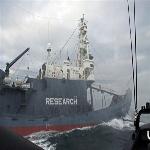05 January 2010

Photo: AFP
The Japanese harpoon vessel 'Shonan Maru No 2' shadows the Sea Shepherd's 'Ady Gil' in the Southern Ocean off Antarctica on 23 Dec 2009
The researchers will sail for Antarctica early next month, in an expedition funded by the Australian and New Zealand governments.
The scientists hope their journey to the Southern Ocean will help to disprove Japan's claims that whales have to be killed to properly study them.
During their six-week voyage, researchers will employ a range of techniques to unlock some of the secrets of the giant marine mammals.
They will fire darts from small air rifles to collect blubber and skin for genetic testing, and to attach satellite-tracking tags to monitor the whales. Samples of dung will also be gathered, photographs taken, and acoustic instruments will record the animals' distinctive calls.
Nick Gales from the Australian Antarctic Division leads the expedition. He thinks it will show that Japan's arguments for whale hunting are misguided.
"Anyone can always come up with a project that you have to kill an animal to measure something," he said. "But the important question is whether or not you need that information and our view very strongly is that, you know, all of that type of information that is relevant to the conservation and management of whales can be gathered using new and very powerful non-lethal tools."
Japan says there are genuine scientific reasons for why it needs to kill hundreds of whales each year in Antarctic waters.
Critics, including the Australian and New Zealand governments, say such arguments are a cover for the sale and consumption of whale meat, which is banned under an international moratorium on commercial hunting.
Japan's whaling fleet is currently on its annual hunt in the icy waters of the Southern Ocean, where it aims to catch about 1,000 whales.